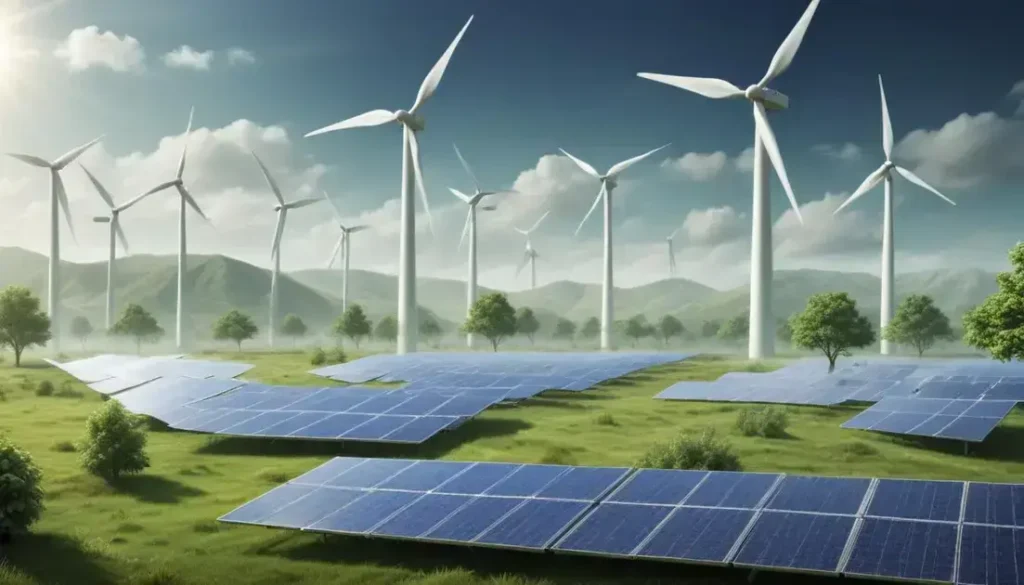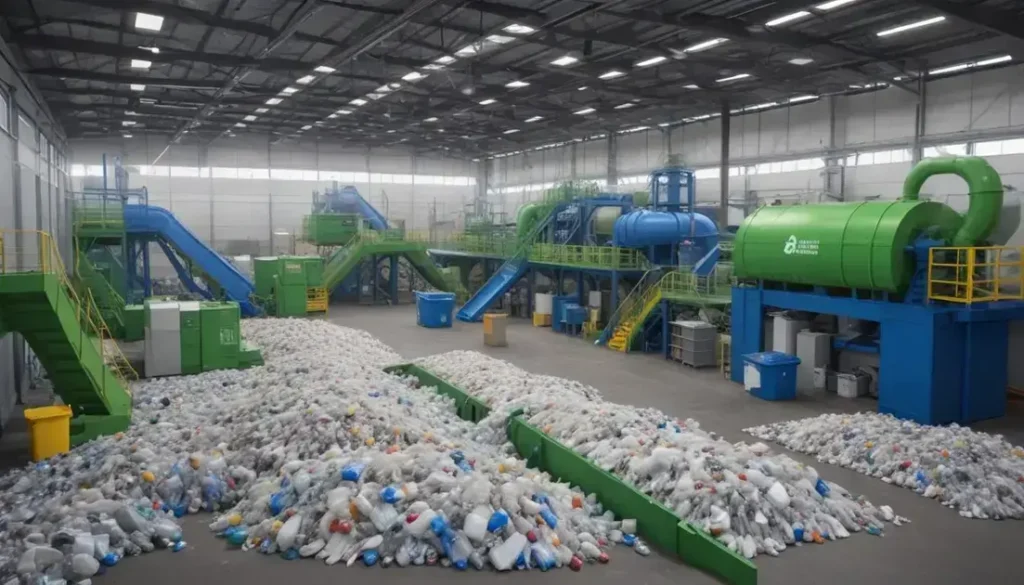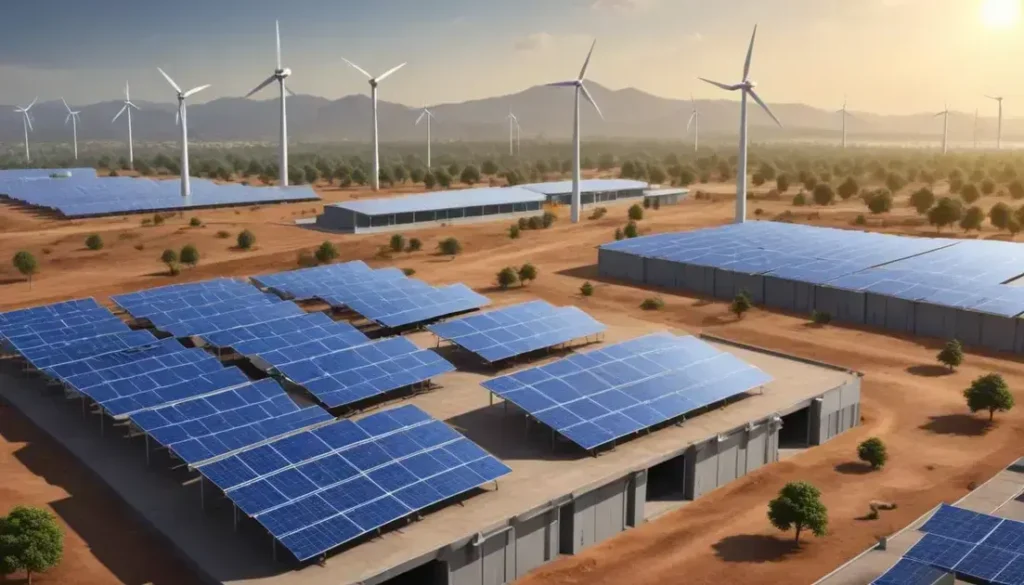The rail and freight sector is rapidly evolving with opportunities for Indian companies to adopt sustainable practices through renewable energy technologies, automation, and innovative logistics solutions, enhancing both efficiency and environmental stewardship.
The recent agreement between Iberdrola and Renfe highlights the growing significance of Renewable Energy in transforming transport sectors. Have you considered how this impacts Indian businesses?
Iberdrola and Renfe’s partnership
A partnership between Iberdrola and Renfe marks a significant leap towards sustainable rail transport. Through this collaboration, Iberdrola will supply green energy generated from wind farms to power Renfe’s operations. This initiative focuses on reducing carbon emissions, contributing to Spain’s ambitious environmental goals.
As part of this agreement, Renfe aims to transition to electric trains that operate on renewable energy. This shift not only enhances the operational efficiency of the rail network but also aligns with global efforts to combat climate change. The integration of wind energy paves the way for more sustainable practices in the transport sector.
The financial implications of such a partnership are noteworthy. With energy costs being one of the largest expenses for rail companies, securing a long-term supply of renewable energy can significantly reduce operational costs. Moreover, this move is expected to attract environmentally conscious investors and enhance the brand’s reputation.
There is also a ripple effect on Indian companies engaged in similar sectors. As Indian firms look to expand their footprint in green energy, partnerships like that of Iberdrola and Renfe serve as a vital reference point. Lessons learned from this collaboration can guide Indian enterprises in adopting innovative solutions that emphasize sustainability.
Details of the wind power purchase agreement
The windows power purchase agreement established between Iberdrola and Renfe is a landmark deal that underscores a commitment to renewable energy. This agreement involves Iberdrola supplying significant amounts of wind energy to fuel Renfe’s rail operations.
Under this contract, Iberdrola will deliver clean energy sourced from its wind farms, ensuring that Renfe’s trains run efficiently and sustainably. This long-term agreement is designed to support Spain’s broader goals of reducing greenhouse gas emissions while enhancing energy security.
The significance of this deal extends beyond financial terms. By locking in a stable supply of renewable energy, Renfe can better manage its operational costs and reduce its dependency on traditional fossil fuels. As energy prices fluctuate, such agreements provide a safeguard against rising costs.
Moreover, the partnership signifies a shift in the energy landscape, where transportation networks increasingly rely on green energy. In addition to promoting environmental sustainability, this move sets an example for other countries, including India, to pursue similar pathways in their transit systems.
Ultimately, the wind power purchase agreement not only benefits the parties involved but also contributes to the broader mission of transitioning to a sustainable future, showcasing innovative solutions in energy procurement.
Impact of renewable energy on rail transport
The impact of renewable energy on rail transport is transforming the industry, paving the way for more sustainable operations. By integrating renewable sources like wind and solar into the energy supply, rail companies are significantly reducing their carbon footprint.
Electric trains powered by renewable energy not only lower greenhouse gas emissions but also enhance energy efficiency. This shift allows for smoother, quieter operations, providing a better experience for passengers and minimizing noise pollution in surrounding communities.
Furthermore, using renewable energy helps rail operators manage costs effectively. With stable energy prices, companies can protect themselves from the volatility associated with fossil fuels. This cost predictability is crucial for long-term financial planning and investment.
Innovations in technology have also facilitated the transition to renewables. Train platforms are increasingly equipped with solar panels and energy storage systems, ensuring that energy is harnessed and utilized effectively. This energy independence boosts resilience against supply chain disruptions.
As more rail networks adopt renewable energy solutions, there are implications for global trade and transportation logistics. Countries that prioritize green energy can attract eco-conscious partnerships and investments, enhancing their standing in international markets. Overall, the integration of renewable energy into rail transport marks a significant milestone towards a sustainable future.
Spain’s electrification of rail networks
Spain’s electrification of rail networks has become a benchmark for sustainable transportation. The initiative aims to transform conventional rail systems into efficient electric networks powered by renewable energy sources. This shift is crucial for reducing the carbon footprint of the transport sector.
With extensive investment in infrastructure, nearly 75% of Spain’s rail lines are electrified, allowing trains to operate cleanly and efficiently. The government’s commitment to this initiative reflects a broader strategy to achieve sustainability and meet climate goals.
Electrification significantly enhances the speed and reliability of train services. Electric trains can accelerate faster and travel longer distances without emissions, making them an attractive option for passengers. The reduced operational costs associated with electric trains also contribute to long-term economic benefits.
Spain’s electrified rail networks serve as a model for other countries seeking to modernize their transit systems. As nations grapple with climate change, lessons from Spain’s successful implementation can provide valuable insights. Furthermore, this transition to electric operations creates opportunities for innovation, including the integration of advanced technologies for energy management.
Overall, Spain’s progress in electrifying rail networks not only promotes a greener transport system but also positions the country as a leader in the global efforts towards sustainable mobility.
Environmental benefits of the agreement
The environmental benefits of the agreement between Iberdrola and Renfe are substantial, marking a significant step forward in sustainable transportation. By shifting to renewable energy sources, this partnership aims to drastically reduce the carbon emissions associated with rail travel.
Utilizing wind and solar power to electrify trains means less reliance on fossil fuels, contributing to cleaner air quality. The substantial decrease in greenhouse gas emissions aligns with global climate goals, showcasing effective collaboration toward a more sustainable future.
Furthermore, the integration of renewable energy into rail systems enhances biodiversity. Reduced environmental impact leads to healthier ecosystems along railway corridors, fostering a balanced relationship between transport infrastructure and nature.
In addition to direct emissions reductions, the agreement promotes energy efficiency and reduces overall energy consumption within the transport sector. Electric trains are generally more efficient than their diesel counterparts, leading to a smaller environmental footprint over their operational lifetime.
This partnership sets a pioneering example for other countries and sectors aiming to implement green solutions. The positive environmental impact highlights the crucial role of collaboration in achieving sustainability. Companies globally can draw inspiration from this agreement, demonstrating that such initiatives are not just beneficial but essential for a greener planet.
Strategic goals for carbon neutrality
The strategic goals for carbon neutrality are crucial in the context of the agreement between Iberdrola and Renfe. By committing to renewable energy solutions, both companies aim to substantially reduce their greenhouse gas emissions and contribute to climate action.
One primary goal is to align with international targets set by various climate agreements, including the Paris Agreement. Achieving carbon neutrality not only involves reducing emissions but also requires investments in renewable energy infrastructure and energy efficiency technologies.
Equally important is the objective of enhancing public transport’s credibility as a sustainable option. By emphasizing electric rail systems powered by renewable sources, the companies aim to attract a larger number of passengers, thereby reducing road traffic and its associated emissions.
Additionally, Iberdrola and Renfe’s partnership is part of a broader strategy to foster innovation within the transport sector. This includes exploring advancements in energy storage systems and electrification technologies that support sustained operations using clean energy.
Finally, engaging local communities and stakeholders is vital. By promoting the benefits of sustainable transport, the partnership seeks to build support for future initiatives. Together, these strategic goals create a robust framework for achieving a carbon-neutral future, positioning both companies as leaders in the transition towards sustainable mobility.
Role of VPPAs in energy management
The role of Virtual Power Purchase Agreements (VPPAs) in energy management is becoming increasingly significant, especially in the context of renewable energy initiatives. VPPAs enable companies to source clean energy without the need to own physical power generation assets. Instead, they sign contracts to purchase the renewable energy produced by wind or solar farms, stabilizing energy costs over time.
One of the primary advantages of VPPAs is their ability to provide long-term price certainty. Companies can hedge against fluctuating energy prices, allowing for more predictable budgeting and financial planning. This is particularly beneficial for large enterprises that heavily depend on energy for their operations.
Additionally, VPPAs align with corporate sustainability goals. By committing to purchase renewable energy, companies can enhance their green credentials, improve their carbon footprint, and contribute to local communities. This commitment not only fosters goodwill but can also attract environmentally conscious consumers.
Moreover, VPPAs play a crucial role in increasing the demand for renewable energy projects. By securing financing for new renewable development, these agreements encourage investments in cleaner energy solutions. Consequently, this leads to more robust energy infrastructure and promotes a transition to a low-carbon economy.
In conclusion, the utilization of VPPAs in energy management represents a strategic move for companies aiming to achieve sustainability while managing energy costs effectively.
Challenges in energy cost management
The challenges in energy cost management are significant for companies transitioning to renewable energy sources. Fluctuations in energy prices can lead to unpredictability in operational costs, which complicates financial planning and budgeting. These variations are often influenced by market dynamics and regulatory changes, making it essential for businesses to remain agile.
Additionally, the initial investment required for renewable energy projects can be substantial. Companies must weigh the long-term savings against the upfront costs of installation, which can deter some firms from making the shift. This financial barrier can slow down the adoption of clean energy technologies that are critical for sustainability.
Another challenge involves the integration of renewable energy into existing infrastructure. Many organizations struggle with updating aging systems to accommodate renewable sources, leading to increased operational complexity. Companies must invest in not just energy resources, but also in technology that supports energy management.
Moreover, lack of access to accurate data smothers informed decision-making. Businesses need detailed insights to forecast energy needs and manage consumption effectively. Without robust data analytics, it becomes difficult to identify inefficiencies and optimize energy use.
Addressing these challenges requires strategic planning, investment in technology, and a dedicated effort to foster a culture of sustainability within organizations. Tackling these obstacles head-on can ensure smoother energy transitions, ultimately benefiting the environment and the bottom line.
Future trends in the rail and freight sector
Future trends in the rail and freight sector are poised to revolutionize transportation, driven largely by advancements in technology and a growing emphasis on sustainability. One significant trend is the increasing use of automation and artificial intelligence to optimize operations. Automated systems can enhance efficiency by streamlining scheduling and routing, ultimately improving service delivery.
Another important trend is the integration of renewable energy sources into rail operations. As companies like Iberdrola and Renfe form partnerships to utilize wind and solar power, the shift towards cleaner energy solutions will reshape the industry’s environmental footprint. This transition enhances operational efficiency while contributing to global efforts to combat climate change.
Additionally, digital technologies are set to play a pivotal role in the rail and freight sector’s evolution. The implementation of data analytics helps companies make informed decisions, monitor performance, and anticipate maintenance needs. This predictive maintenance can significantly reduce downtime and costs.
Furthermore, the trend towards more sustainable logistics solutions is gaining traction. Companies are increasingly focusing on intermodal transport, which combines various modes of transport for enhanced efficiency and reduced emissions. This approach not only minimizes the environmental impact but also facilitates smoother supply chain operations.
Overall, the rail and freight sector is on the brink of transformation, with innovation and sustainability driving its future direction.
Opportunities for Indian companies
The evolving landscape of the rail and freight sector presents numerous opportunities for Indian companies. As global demand for sustainable transportation solutions grows, Indian firms can capitalize on this movement by leveraging renewable energy technologies and innovative logistics strategies.
One key opportunity lies in the development of green technologies. Companies focusing on solar and wind energy can engage in partnerships with international firms, contributing to projects that electrify rail networks. This collaboration can enhance India’s infrastructure while aligning with global sustainability goals.
Moreover, as the industry moves towards automation, Indian companies in technology and engineering can offer software and hardware solutions to improve operational efficiency. Implementing automated systems can streamline logistics, enhance tracking, and improve inventory management, providing a competitive edge in the market.
Additionally, the push for intermodal transport can benefit Indian logistics firms looking to diversify their services. By integrating rail transport with road and air freight, companies can offer comprehensive logistics solutions that reduce costs and emissions, appealing to environmentally conscious clients.
Lastly, Indian companies can also explore investments in infrastructure development. The focus on enhancing rail connectivity can lead to substantial government contracts, propelling growth and innovation within the sector. By seizing these opportunities, Indian firms can position themselves as key players in the sustainable transport revolution.
In Conclusion
The rail and freight sector is undergoing significant transformations driven by sustainability and technology. As companies adapt to these changes, numerous opportunities arise, especially for Indian firms looking to engage in green technologies and innovative logistics solutions.
By focusing on automation, renewable energy, and integrated transport systems, Indian companies can not only improve efficiency but also contribute to environmental goals. Collaboration between local and international firms can enhance infrastructure and provide avenues for growth in this evolving industry.
Embracing these opportunities will enable Indian companies to thrive in the global market and play a crucial role in creating a more sustainable future for transportation.
Frequently Asked Questions
What are the key benefits of adopting renewable energy in the rail sector?
Adopting renewable energy reduces carbon emissions, lowers operating costs, and enhances sustainability, making transport more environmentally friendly.
How can Indian companies take advantage of green technologies?
Indian companies can invest in renewable energy projects, collaborate with international partners, and innovate in logistics solutions to enhance their sustainability initiatives.
What role does automation play in the future of the freight sector?
Automation streamlines operations by improving efficiency in scheduling, tracking, and inventory management, which can lead to cost savings and better service.
How does intermodal transport benefit the environment?
Intermodal transport reduces emissions by using multiple modes of transport, minimizing the distance traveled by road, and optimizing logistics efficiency.
What challenges do companies face when transitioning to renewable energy?
Companies may encounter high initial costs, integration issues with existing systems, and the need for accurate data to make informed decisions.
Why is predictive maintenance important in the rail industry?
Predictive maintenance helps prevent equipment failures and reduces downtime, leading to lower operational costs and improved reliability in rail services.


